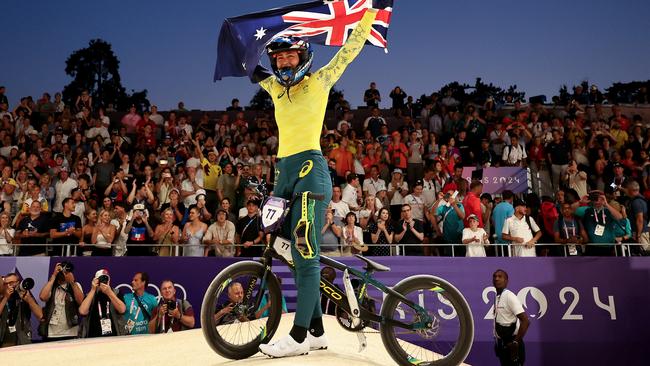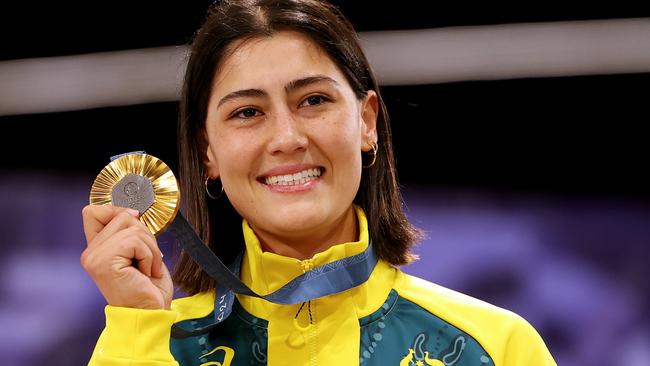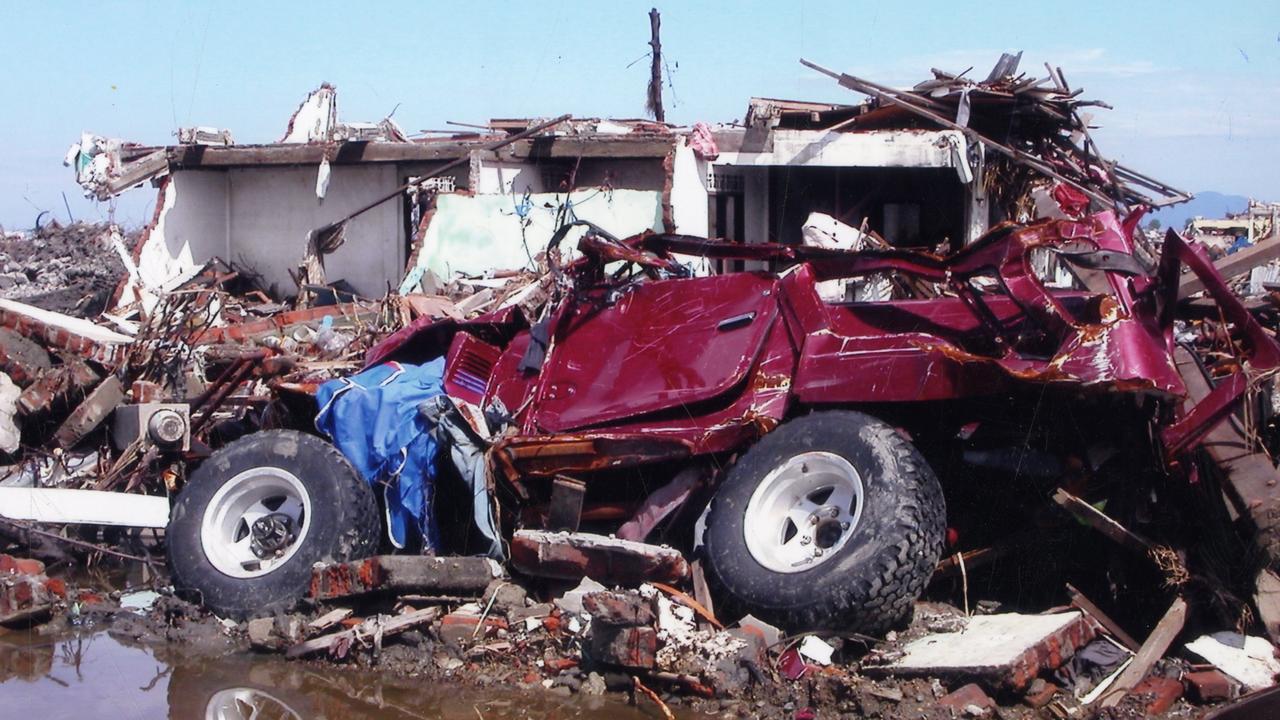The Olympic Games isn’t the same with pesky time zones and no Bruce McAvaney | Graham Cornes
The Olympic Games is the biggest sporting event in the world, but it just doesn’t feel right without the ‘special’ man making his iconic calls, writes Graham Cornes.

Opinion
Don't miss out on the headlines from Opinion. Followed categories will be added to My News.
THE Olympic Games is the biggest sporting event on the planet. Paris is one of the most exciting, beautiful cities in the world. Combine the two and it would seem an irresistible, watch-at-all-costs event.
Why doesn’t it feel like it? There are two reasons for this. One is the time zone differences. Two – there is no Bruce. It can’t be an Olympic Games without Bruce McAvaney.
I know he’s in Paris somewhere but he’s yet to be seen in live coverage. Not that Gerard Whateley’s athletics commentary hasn’t been superb. He nailed the 100 metres final when any one of five runners could have won, and his commentary of the marque 1500 metres men’s final was epic.

When the others missed the threat of the surprise winner Cole Hocker, he captured it in an exciting call. But we missed Bruce. Not only that: we miss so much of the live action because of the time difference. All the action happens in the middle of our South Australian night.
We are left then with replays, wrap-ups and the daily Advertiser. It’s never the same.
It has to be live to have the same lasting impact. The last Olympic Games were held in Tokyo which was perfect. They are only half an hour behind us. Much more respectable. But I guess the IOC doesn’t factor in longitudes when awarding Olympic Games - unless it impacts on the Americans. So we search for the replays and the updates and inevitably are assailed by eastern states’ Channel Nine “personalities.” Oh how important they are - even those who have no sporting background or interest whatsoever.
Of course that doesn’t include our own Brenton Ragless, one of Adelaide’s nice guys, but there is an air of superiority about those eastern-staters, that the camera’s lens and 16,000 kms can’t disguise. And some of the commentators? Tuning into the diving and hearing a familiar voice: surely that’s not Mark Taylor, the great Australian Test captain? Indeed it was.
To be fair he did impress with his knowledge of the sport. But it just didn’t sound right. Besides, I’m not sure “She’s nailed it”, is a commonly accepted compliment in the diving world And Matthew Pavlich at the equestrian events? Maybe if he came off the farm, but he is a city boy after all.
The athletes, however, have no understanding of these first-world problems. They are living in the self-indulgent, self-absorbing world of record times and personal bests.


Our Australian athletes have achieved plenty of them. It’s been our best-ever haul of gold medals – 18 at last count - with possibly more to come. We are sitting third on the gold medal table. It eclipses the 17 gold medals won in Tokyo. Some of us can remember the triumph in Melbourne in 1956 when Australia won 13 gold and 35 medals in total.
It has often been described as Australia’s best -ever performance at an Olympics and athletes of those games, like Dawn Fraser, are still household names today.
Paris, by the numbers, has been our most productive games but the numbers are distorted somewhat. For instance, in Melbourne 323 Australian Athletes competed in 145 events in only 17 sports. In Paris the Australian team of 460 could compete in the 329 events of 32 different sports. It’s little wonder the medal tally is greater. That’s not to denigrate the achievements of the team from 2024 and its an amazing recovery from the Montreal disaster in 1976, but it does add perspective. We lost interest in the Olympic Games after Montreal where not one gold medal was won by an Australian. One silver medal and four bronze medals was the embarrassing tally. That silver medal was won by the men’s hockey team.
There was no hero’s homecoming for individual athletes after those games but it did stimulate successive governments to invest in and establish the Australian Institute of Sport.
No longer did Australian amateur athletes have to compete unfairly with the international competitors. Those men’s and women’s hockey teams have done us proud over the years.
One wonders now, after the scandal of Hockeyroo Tom Craig’s cocaine bust in Paris, how common is the abuse of the drug amongst sportspeople.
Melbourne’s Joel Smith tested positive to cocaine after a match last season and two Sydney AFLW players, Alexia Hamilton and Paige Sheppard were charged with possession last year. But Craig’s case is in Paris, after an Olympic Games. He cannot avoid the scandal. He should not represent Australia again.

However, enough of the negativity. Even if you were averse at getting up in the dark, ridiculously early hours of the morning and relied on the replays, you would have seen some really remarkable achievements. It’s not quite the same if you already know the results but it does not detract from the heroics of the Australian athletes.
The women swimmers and Jessica Fox fulfilled expectations and did us proud, but we’re sort of used to that. Relief is the emotion rather than jubilation. It’s the unexpected victories that are most uplifting.
BMX racer Saya Sakakibara swept aside the opposition to win the gold medal three years after her brother Kai nearly lost his life in a serious crash in the Tokyo Olympics.
“I f----ing went for it”, she said emotionally and repeated the expletive-laden statement.
No one cared, no one was offended. BMX racing? Who would have thought it would be an Olympic sport, but what kid wouldn’t dream of doing it? It looks so exciting. It’s one of those new-age sports like BMX Freestyle where they perform impossible, death-defying tricks.
Skate-boarding, in which two Australian kids won gold medals, is another. And you can argue whether break-dancing should be an Olympic sport but it looks just as hard as gymnastics. Elite performers in any endeavour are captivating to watch. Did you see the speed climbing? Two athletes defying gravity and scurrying like lizards up a vertical 15 metre wall in six seconds or less. It was truly amazing. I don’t think it’s caught on in Australia yet but it’s big in Indonesia.
The opening ceremony was a dud, holding swimming events in the River Seine was a ridiculous idea, we haven’t seen enough of Bruce and the time difference makes watching awkward, but anyone will find their own captivating moment in an Olympic Games. Mine came in the medal presentation of the women’s BMX Freestyle. Australia’s Natayla Diehm, one month off her 27th birthday, after rupturing her ACL five times, had won the bronze medal. Her joy and exuberance were infectious. On mounting the dais to receive her medal she shouted defiantly to the crowd: “I COME FROM A LAND DOWN UNDER!”
The rest of the world probably doesn’t know what that means, but we do. That’s Australia.






